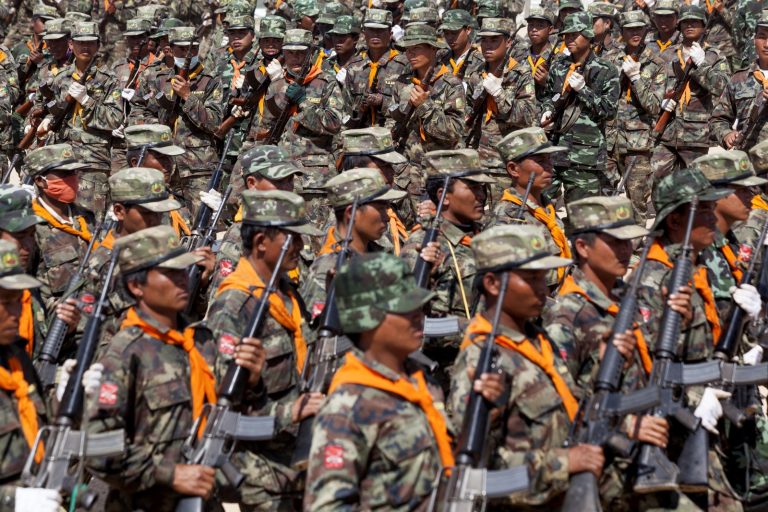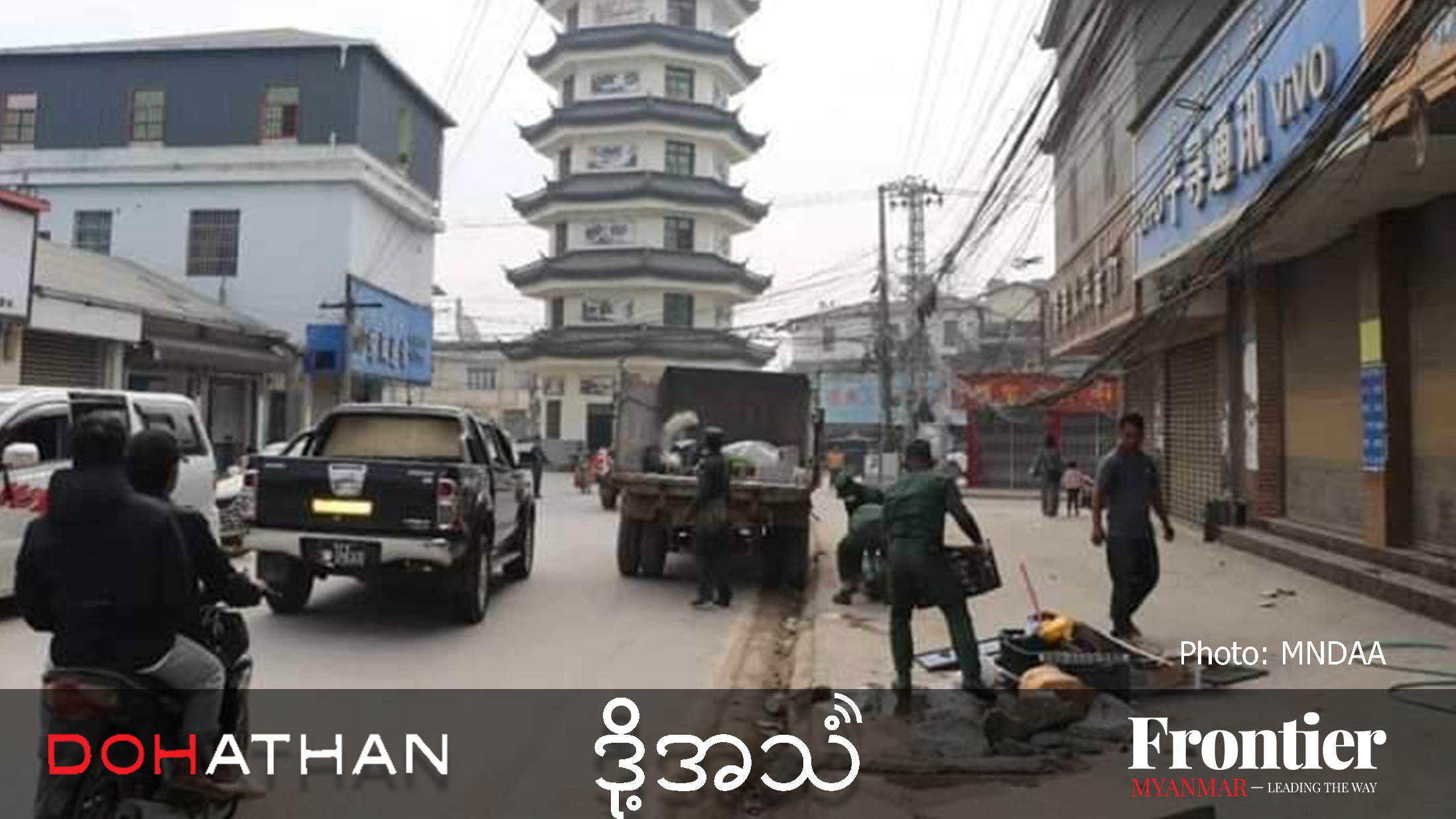Opium production is causing severe environmental degradation in northern Shan State, but a crop substitution project in the south is a reason for hope.
By NIELS LARSEN | FRONTIER

The TNLA enforces harsh justice for opium growers and addicts. (Niels Larsen / Frontier)
The journey to the San Nin Valley from the Shan State capital, Taunggyi, takes more than four hours on poorly-maintained roads washed out by the heavy monsoon rain. The view from the top of ridge should be breathtaking. But on this late-July afternoon, farmers are busy clearing land using slash-and-burn techniques, creating pyres of burning waste that have a severe effect on their environment. In about five months, this smoky valley will be covered with the colourful blooms of the opium poppy.
Although the damage caused by opium and its derivative, heroin, on Myanmar society and people is well documented, the destructive environmental impact of poppy production in the mountainous, ethnic-minority regions of the Shan highlands is less well known.
The Ta’ang National Liberation Army has taken drastic steps to eradicate opium production in areas under its control, where addication rates are as high as 70 percent of the working-age in some villages.
Driven by rising demand for heroin from regional markets, particularly China, an increasing number of farmers have begun cultivating poppy in remote, untouched regions of Shan State and elsewhere in the country. Opium poppy production in Myanmar is estimated to have more than tripled since 2006; in 2014 poppies were grown on more than 57,000 hectares (nearly 141,000 acres) throughout the country.
Support more independent journalism like this. Sign up to be a Frontier member.
The creation of new fields for poppy cultivation has devastating ecological consequences. When they settle in a new location, slash-and-burn farmers chop down vast numbers of trees, in some cases deforesting entire valleys to make room for new poppy fields.
The soil of hillsides shorn of their forest cover is unprotected from the elements and is easily washed away by rain, denuding the ground of nutrients. The increased runoff from bare hillsides also increases the risk of landslides and flooding. In the long term, deforested areas become unfit for farming, forcing the slash-and-burn opium growers to move, repeating the cycle of destruction.
Papaver somniferum, the opium poppy, is also detrimental to the land because it exhausts all the nutrients from the soil in which it is planted in just a few years. This means that opium growers need to use large amounts of fertiliser to maintain a constant yield from one harvest to the next.
Buying fertiliser is a financial burden on impoverished farmers and as the land becomes increasingly barren it cannot be used for other crops. Unless corrective measures are taken, the likely result is desertification.
Further north in Shan State, the Ta’ang National Liberation Army, which has engaged in renewed fighting with government forces since 2011, has taken drastic steps to eradicate opium production in areas under its control, where addication rates are as high as 70 percent of the working-age in some villages. The TNLA uses extreme measures, such as “sealing off” entire villages with high addiction rates, to force addicts into withdrawal.
Combined with its own eradication programs, these measures have caused poppy cultivation in its operational zones to decrease considerably. Despite their harshness, the TNLA’s methods enjoy wide support from village elders, religious leaders, and civil society. But farmers need a source of income and unlike their counterparts in the San Nin Valley, a lack of alternatives has prompted many to turn to another extremely destructive activity: making charcoal.
The production process begins with felling trees that are then chopped into smaller pieces and burned in clay ovens built along mountain roads. The ubiquity of the ovens has prompted children in some villages to dig small holes in mud walls in imitation of their parents, rather than playing with their few toys. Charcoal production is a labour-intensive process for the farmers, and one that requires large quantities of wood. The charcoal is packed into big bags which are sold to traders for K2,000 (about US$1.70) each.
Ironically, the social hierarchy of charcoal manufacturing is largely identical to that of poppy farming, which – in northern Shan State – is dominated by large plantations that formerly grew poppies. The owners of the large plantations are the only ones able to muster the capital necessary to transport charcoal to cities in Myanmar and China.
Because most of the forests around their villages have already been clear-felled, farmers have migrated to temporary logging camps in remote areas. Once the forest has been exhausted, charcoal burners move to new logging sites and build more kilns in the surrounding mountainsides. The result is that deforestation in charcoal producing areas is spreading faster than in regions where poppy is grown.
The TNLA is aware of the long-term dangers of intense logging, its senior officers say, but they reaffirm that drug eradication is a strategic priority. They admit to not having the resources to implement alternative development programs, for which they hope to receive assistance from international organisations. But the fighting in northern Shan State means that opportunities for engagement with international groups are limited.
Because southern Shan State is more peaceful than the north, recent efforts to implement sustainable, environmentally-friendly crop substitution programs have focused on areas near Taunggyi, including the San Nin Valley. However, the government’s drug eradication programs in southern Shan State – which, like the TNLA’s efforts, also employ highly repressive methods – have failed to curb poppy production.
In 2011, the United Nations Office on Drugs and Crime launched an innovative project in the region based on a successful crop substitution program in Peru. Over the course of three years, farmers in selected villages will progressively substitute their poppies for high-end coffee. The program has also entailed the creation of forest nurseries in villages, and saplings will soon be planted on mountaintops throughout the valley.
The response to the UNODC project has so far been positive. Fear of government drug eradication campaigns, poor yields, and the rapacity of drug traders who buy their raw opium, has convinced poppy growers to transform their fields into ‘legitimate’ enterprises – a deal sweetened by UNODC assurances that their income levels will be maintained, or increase. The valley’s coffee farmers have formed a cooperative to transport their crop to market, but will have to wait three years before the bushes are productive. The first harvest of coffee from UNODC-backed substitution projects elsewhere in southern Shan State is expected in November.






